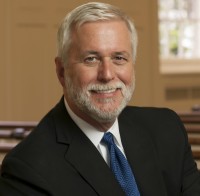Other people’s faith in you
You knew about weakness before you were ordained. Yet something made you get out of the boat and try to walk.
A placard with a quote from Dag Hammarskjöld sits on the corner of my desk at home. I look at it countless times every evening when I’m trying to complete the day’s work. It whispers a penetrating truth about pastoral leadership: “The humility that comes from others having faith in you . . .”
It’s not a complete sentence. But it’s relentless with its reminder that people have faith in me, and the overwhelming humility of receiving that faith, and the . . .
How does any pastor complete that sentence? There is simply the vote of faith and the plummeting humility because you know your limitations far better than those who did the voting at the congregational meeting. And you know the uncertainty about how this ends.
Read our latest issue or browse back issues.
You feel in your bones that people’s faith in you could evaporate any day no matter how hard you work. Your best ideas can fail, your weaknesses will become the topic of hushed conversations, and those who emphasize the need for change will always be the ones to sabotage your efforts at offering it.
You knew at least some of this before you took the vows of ordination. But something in your soul made you get out of the boat and start walking toward Jesus’ call across the stormy waves—even though you’ve always been perfectly clear you can’t walk on water.
Your family also has faith in you, which is both comfort and pressure. They want you to be successful because they love you and believe in your gifts, but they’re also counting on you to provide a safe life. So late at night when you’re fretting about the church’s crises de jour, you wonder if you should have just stayed in the boat.
But conflicts are not the greatest reasons for a pastor’s humility. A phone call beckons you to go to a home where a teenager has died of suicide, and when you arrive, the family looks at you as if you know what to say. You hold a baby and carry it through the holy waters of baptism. At a fresh grave an old widower lingers next to you after you’ve buried his lifelong lover, then reaches out to take your hand. And every Sunday you put on vestments and stand behind a pulpit looking out at pews filled with people who believe you can offer them a word from God.
Why do you, a flawed mortal, get such holy moments? Even your gratitude is so humbling that at times you wonder if you can continue.
The great leaders of history have always been reluctant. They had other plans for life. But something happened to push them into a responsible role. It wasn’t really their skills or résumés, and certainly not their ambition.
Mostly, the great leaders were just true believers in a cause. And the people around them had faith that they could make a difference. Some did, at least for a while. That’s all it took to do things like emancipate slaves, pass civil rights legislation, or provide affordable health care. There’s no evidence that these leaders were having a good time along the way, but they knew what they had to do.
Gregory the Great was one of the best popes ever. He pretty much saved Rome from economic, political, and spiritual crisis in the sixth century. But he only wanted to be a monk. He called himself “a contemplative condemned to action.” That reluctance is one of the reasons he is known in history as “the Great.”
The worst leaders are those who narcissistically believe they’re destined to greatness. That always ends in a Waterloo, a maniac fiddling while Rome burns, or even the horrors of a holocaust. History cautions us never to have faith in a leader who isn’t reluctant.
It is not at all clear from the Gospels that Jesus aspired to anything resembling what contemporary literature calls leadership. He could have been a carpenter like his father, and for all we know may have wanted to. Instead, he kept attending to the next person who was hungry, blind, leprous, branded as sinful, or driven out of his mind by demons. And he had a passion for talking about his other Father. Along the way he called some to follow him in this work but was constantly frustrated by their inability to understand what he was trying to do. In the end, when it was clear to him that being the Messiah would cost him his life, he was alone praying to be spared from his calling.
So do all pastors who pick up their crosses and follow him. Earlier in life they wanted to be carpenters or contemplatives. As the cross of leadership becomes clearer in their minds, they return to those old visions. And before every contentious congregational meeting they silently pray, “Please, dear God, let this cup pass from me.”
But it doesn’t. Somehow you get through the awful meeting with a few more wounds, go home to a bowl of soup warmed up by a patient spouse, somehow fall to sleep, and get to the hospital at 6 a.m. the next morning, just before a parishioner goes into surgery.







